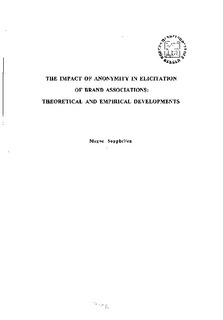| dc.description.abstract | Effective brand management requires a thorough understanding of the consumer. In particular,
managers need to know which associations consumers have for their brands. In this study, we
address the role of anonymity in interviews designed to elicit brand associations from consumers'
memories. First, the concept of anonymity is examined in order to arrive at a useful definition.
Based on a review ofpotential psychological motives for response distortion and a review of the
nature ofbrand associations, we derive two types of anonymity; social - and self anonymity.
Social anonymity is defined as the degree to which respondents believe that someone else can
identify him or her as a respondent. Self anonymity denotes the extent of outer-directed awareness
during an interview, or in other words, the lack of self-focus.
An experiment involving 205 undergraduate students was conducted to test the effects on elicitation
outcomes of different techniques selected to induce different types of anonymity. Specifically,
techniques offering selfanonymity (such as third-person questioning) were deemed more effective
in alleviating motives ofresponse distortion than techniques offering no anonymity or social
anonymity (such as self-administered questionnaires). Self-anonymity was expected to be more
effective because this type of anonymity guards against both socially-directed and intra-psychic
motivations for response distortion. In support of this contention, for a brand with latent symbolic
associations, self anonymity was shown to evoke different and more valid associations than a non-
anonymity condition. Moreover, self-monitoring was found to be a significant negative moderator
of the ability of associations to predict brand attitudes when no anonymity was provided, whereas
no such effect of self-monitoring was observed for associations elicited under conditions of self
anonymity. This finding supports a motivational explanation of the effects of self anonymity
observed in this study. | en |
